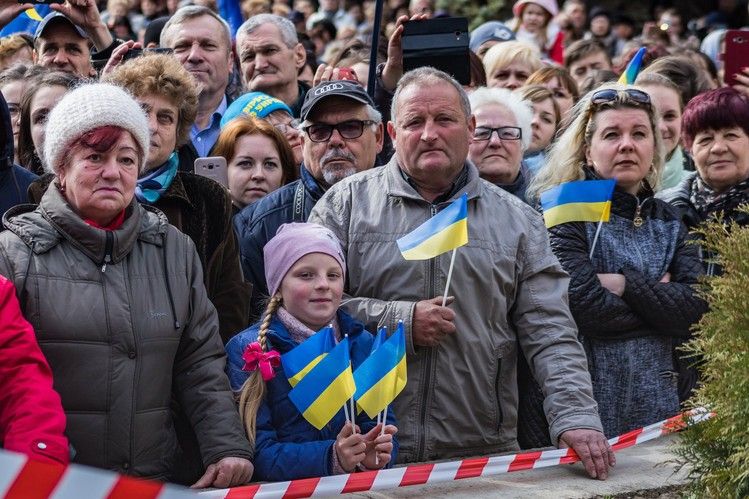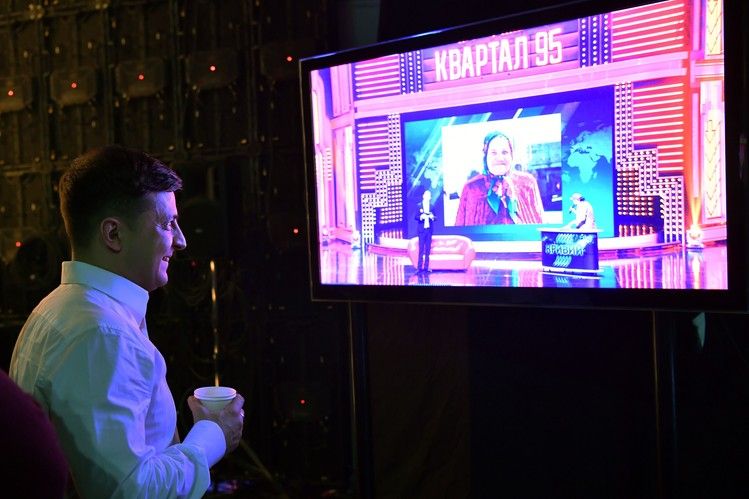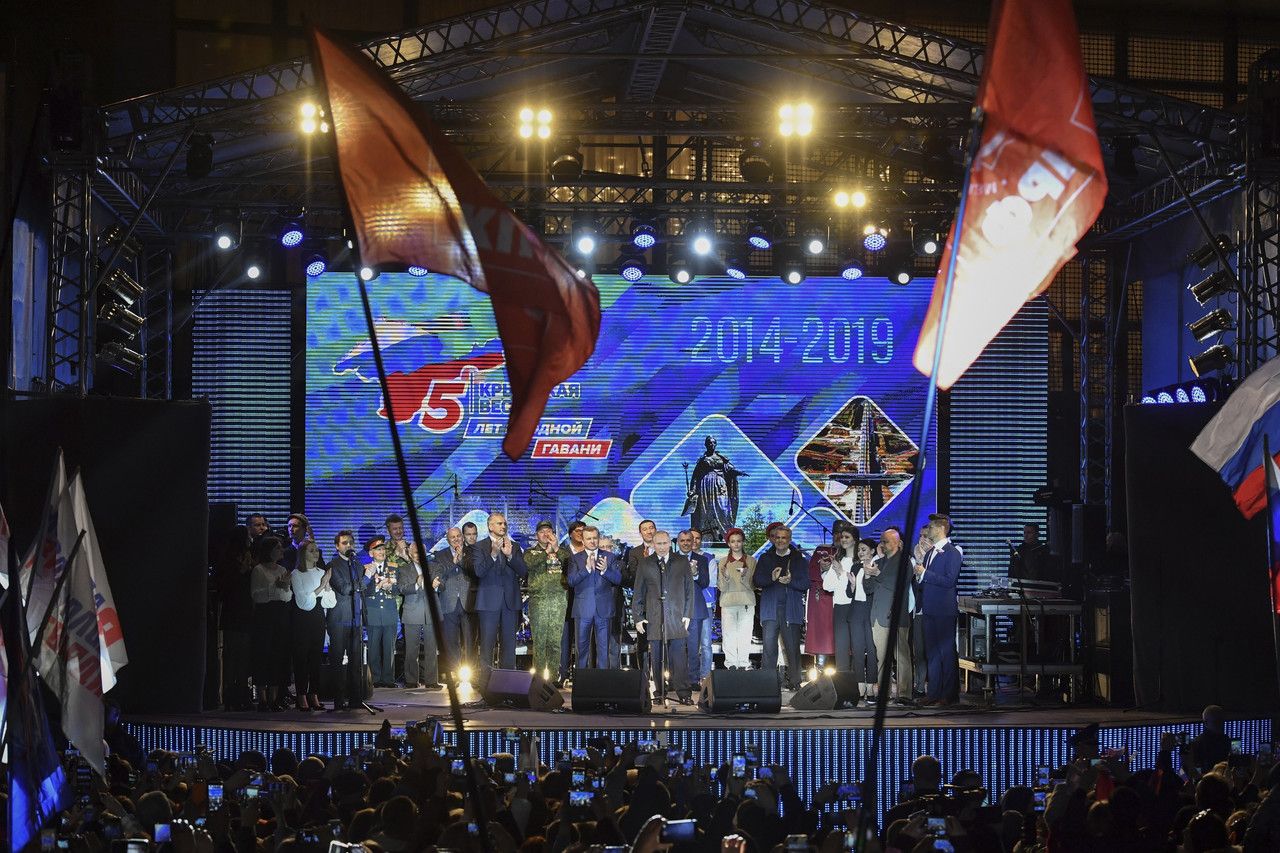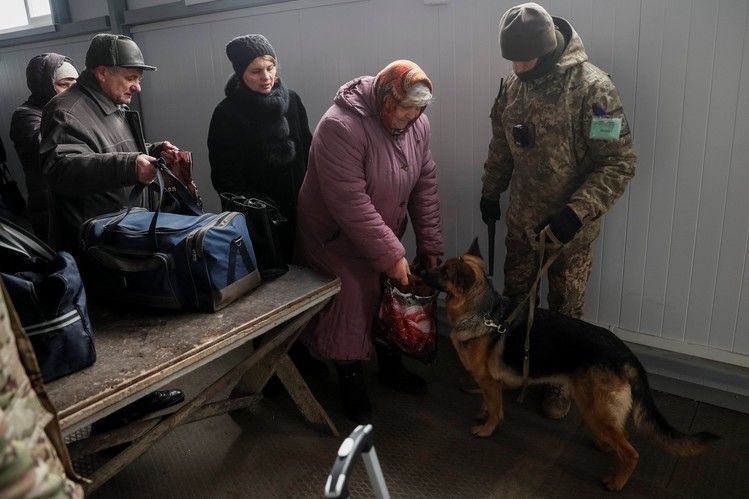
The Revolution That Wasn’t: Disillusioned Ukrainians Head to Polls
Frustrated with graft, their inability to join NATO and the EU and a conflict with Russia, voters make a politically inexperienced comedian their top candidate
A bus passes a campaign poster of Ukrainian President Petro Poroshenko in Lviv, Ukraine. His re-election bid trails the frontrunner in Sunday’s vote. GLEB GARANICH/Reuters
By
Georgi Kantchev
March 28, 2019 9:00 a.m. ET
KIEV—Five years ago, Ukrainians staged a revolution that sought to throw off a Russia-backed government and sweep away a corrupt ruling class. Europe and the West would pull the country into their orbit, reviving a long-suffering economy, they hoped.
Today, as Ukrainians prepare to vote in Sunday’s presidential election, that revolutionary fervor has dissipated into widespread disillusionment. A war with Russian-backed fighters drags on, frustrating the country’s hopes for swift membership in the North Atlantic Treaty Organization and the European Union, and an economy dependent on Western aid is still beset by chronic corruption.
“Our hopes have been dashed,” said 24-year-old advertising professional Maria Nedelko. “The political elites used the people’s aspiration for change for their own interests.”

Supporters of Yulia Tymoshenko listened this week to the former Ukrainian leader and current candidate during a campaign event in Uzhhorod. Photo: janos nemes/Shutterstock
Sunday’s vote will be a referendum on which of several dozen candidates can pull Ukraine’s economy—Europe’s second-poorest after Moldova—out of the dumps, snuff out graft and stand up to Russia’s efforts to return the country to its sphere of influence. The yearning for change is such that a comedian with no political experience is now leading the polls, besting a sitting president and a former prime minister.
For Washington and other Western capitals, which have invested billions of aid dollars and significant political resources, Ukraine is the front line in their deteriorating relations with Moscow.
“This election is critical for everybody: Ukrainians want faster progress, Russia wants a subservient neighbor and the West wants stability in an important region,” said John Herbst, former U.S. Ambassador to Ukraine.
Just 9% of Ukrainians have confidence in their government, the lowest level in the world, down from 24% during the 2014 protests, according to a 2018 Gallup survey.
“People are angry, people are on the edge,” said Vitaliy Shabunin, chairman of the Anticorruption Action Center in Kiev. “You can feel it in the air.”

Volodymyr Zelensky, a comedian who leads the polls, watched TV backstage during one of his shows in Kiev this month. Mr. Zelenksy continues to perform during the campaign. Photo: sergei supinsky/Agence France-Presse/Getty Images
Tapping into the widespread disillusionment is Volodymyr Zelensky, a popular comedian who plays a teacher-turned-president in a hit TV series. He is leading a three-way race ahead of the incumbent, President Petro Poroshenko, and former Prime Minister Yulia Tymoshenko. The vote is scheduled for Sunday, with an expected runoff set for April 21 if no candidate gets more than half the vote.
Russia looms large over the vote. After deadly protests toppled the country’s Kremlin-backed leader in 2014, Russia annexed the Crimean Peninsula and launched a covert military operation in eastern Ukraine, leaving a territory larger than the state of Connecticut under separatist control. The conflict has claimed more than 13,000 lives. Russia still holds 24 Ukrainian sailors after it seized three Ukrainian naval ships in November during a tense standoff.
Now, Russia-backed hackers are stepping up efforts to disrupt the election, Ukraine’s cyber police said last month. Moscow denies meddling.
All three leading candidates promise a hard line on Russia.
On domestic issues, voters who had hoped the revolution would break the grip of oligarchs and corrupt politicians are bitterly disappointed with Mr. Poroshenko, a chocolate tycoon. Ukraine now ranks among Europe’s most corrupt in a poll by Transparency International. Politically connected firms control over 20% of the revenue and over a quarter of the assets of all Ukrainian companies, according to the World Bank.

Russian President Vladimir Putin spoke at an outdoor concert in Crimea’s regional capital of Simferopol earlier this month to mark the fifth anniversary of the peninsula's annexation by Moscow. Photo: Yuri Kadobnov/Associated Press
The International Monetary Fund—whose multibillion-dollar funding keeps Ukraine’s economy afloat—has demanded the government implement antigraft laws. However, last month, the country’s Constitutional Court struck down a key anticorruption law, drawing harsh criticism from abroad.
U.S. Ambassador Marie Yovanovitch called earlier this month for the government to dismiss a special anticorruption prosecutor who has been accused of helping corruption suspects to dodge criminal charges.
Meanwhile, since 2013, average wages have fallen by a fifth to $320 a month, while gas prices have risen 800%.
Mr. Poroshenko has made some progress during his five-year term, stabilizing Ukraine’s finances and cleaning up a bloated banking sector, but he acknowledges shortcomings. “I am ready to recognize that the speed of the changes is not very high. I want to see a higher speed,” Mr. Poroshenko said in a recent interview, promising to improve living standards in a second term.
Ms. Tymoshenko, a political survivor who was imprisoned by Mr. Poroshenko’s predecessor, is also promising to tackle impoverishment.
“It is crucially important to change the system of the rotten government in order to save the country from poverty and war. Otherwise, the whole Ukrainian nation existence will be in danger,” Ms. Tymoshenko said at a rally last month.

A border guard recently checked the luggage of people crossing the line between pro-Moscow rebels and Ukrainian troops in Mayorsk, Ukraine. Photo: gleb garanich/Reuters
The yearning for a fresh face has pushed Mr. Zelensky to the top of a heap of about 40 candidates. According to recent polls, he would get around 25% of votes, his two main opponents trailing at around 18% each.
Like his teacher character in the Ukrainian TV show “Servant of the People,” which has been picked up by Netflix, his platform focuses on tackling corruption. Even as he campaigns, Mr. Zelensky still shoots his show—its third season premiered on Wednesday—and does stand-up comedy.
His opponents, however, point to his lack of political experience.
“Should I be president? Well, let’s see, I have legal education and that’s a plus. I have no political experience... And that is a huge plus,” Mr. Zelenskiy said in October. His strategists say that Mr. Zelensky’s experience running a TV business can be used in government.
Close to 40% of voters, though, are still undecided, polls show, underscoring the deep discontent with the political class at large in Ukraine.
After he fought in the 2015 war, Leonid Ostaltsev returned to Kiev and opened a restaurant called Veterano Pizza, which mostly hired veterans like himself. On a recent day, he wasn’t optimistic about Sunday’s vote.
“I don’t see anybody promising, they are all connected,” Mr. Ostaltsev said sitting in his restaurant, its walls covered with military emblems and bullet casings. “Ukraine is fighting two wars: one in the east and one against the corruption of the elite.”
—James Marson in Munich and Veronika Melkozerova in Kiev contributed to this article.
Write to Georgi Kantchev at georgi.kantchev@wsj.com
